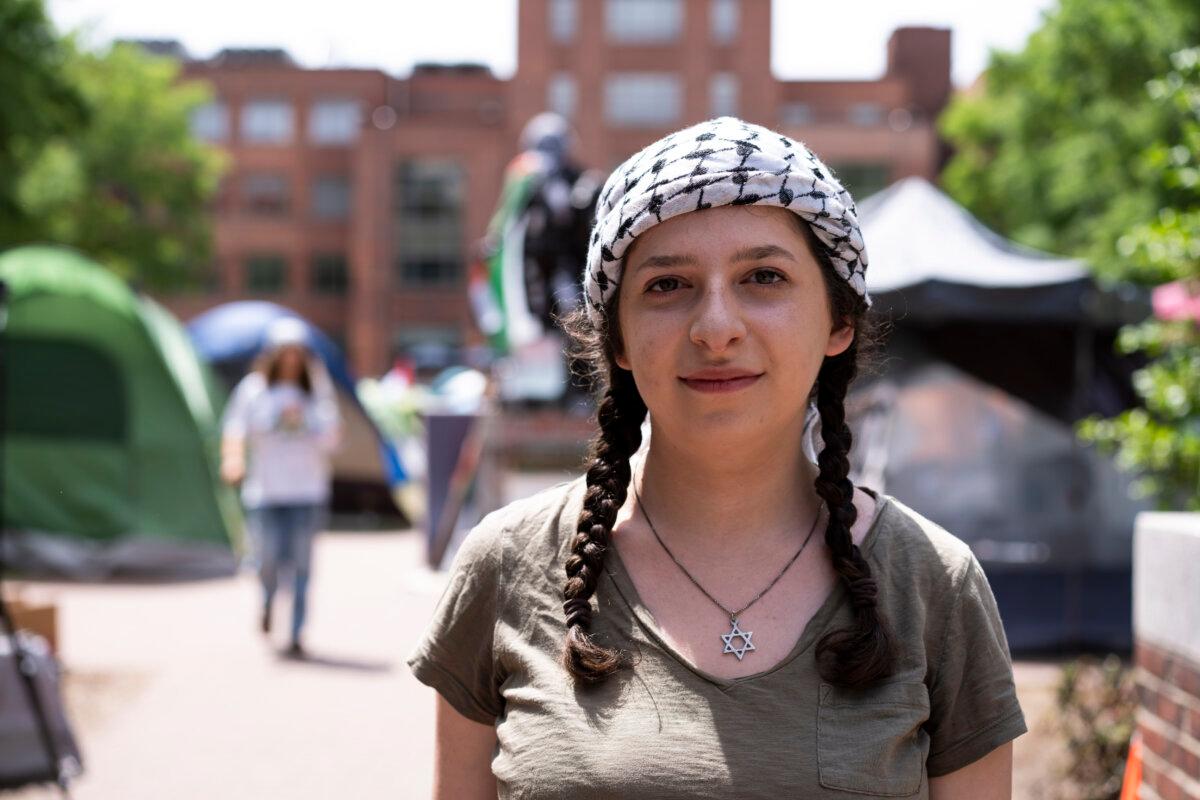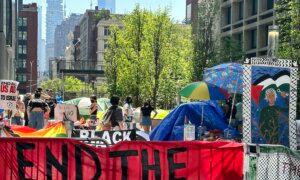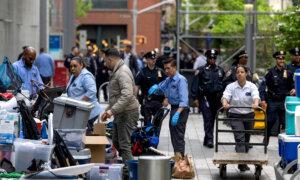Biden campaign addresses student unrest, but dismisses potential influence on re-election odds as a blip on the ‘crisis cycle’ that won’t resonate in November.
Universities and colleges are in turmoil but, with semesters drawing to a close and commencements underway, students—and the “outside agitators” orchestrating them—will soon be headed home, campuses emptied, and other urgencies will fill TV screens, fixating the nation’s attention on that until the next “crisis” comes along, repeat-and-rinse.
That appears to be President Joe Biden’s re-election campaign response to questions regarding his administration’s reactions to the largest groundswell of campus unrest since the 1980s anti-apartheid and 1960/70s Vietnam War protests.
Pro-Palestinian groups, often inside ad hoc encampments, are demanding an end to the war in Gaza and university divestment from Israel. They have embroiled at least 50 universities and colleges across 30 states in standoffs with police. As of May 3, more than 2,200 people have been arrested on campuses in at least 22 states since April 18.
“Dissent is essential to democracy,” Mr. Biden told reporters on May 2 at the White House, his first comments on the campus protests since mid-April.
“But dissent must never lead to disorder or to denying the rights of others so students can finish the semester and their college education,” he said.
Mr. Biden confirmed he had no plans to change Middle East policy, withdraw U.S. support for Israel, call out the National Guard, or criticize—despite pressure from some progressives—university officials who called for police to clear ad hoc encampments from campus quads.
This, too, will pass, seems to be the message from the administration and Mr. Biden’s campaign.
“When it comes to something like this, he doesn’t need to follow anyone or follow someone else,” White House Press Secretary Karine Jean-Pierre told reporters. “We’ve been really consistent, I believe, in stating that when it comes to violence, violence is not protected.”

‘Empty Words’
April protests may not lead to November votes but, of course, every repeat-and-rinse “crisis” cycle during an election year means there must be an instant assessment to gauge how it affects candidates and races right now.
“It’s certainly valuable that Biden spoke up against the pro-Palestine protests this week but they’re empty words,” Yossi Hertz, 32, told The Epoch Times on May 2 as he observed pro-Palestinian protesters at The New School in Manhattan.
The Brooklyn native, a master’s student at Hebrew University in Jerusalem and an active Israel Defense Forces (IDF) reservist, said young voters want more from President Biden.
“The president has a bully pulpit and his voice is obviously the most important voice in the country but at the same time, more is needed,” he said. “When Jewish students’ rights are abused and yet President Biden chooses not to protect them with actual real teeth, that’s not just disappointing but it’s also deeply problematic.”
Bully pulpit talk needs action, Mr. Hertz said.
“I’d like to see him endorse the use of force in order to protect the civil rights of Jewish people and pro-Israel students who simply want to express their ethnicity and nationality,” he said.
Even before the campus protests, Democrats were concerned that President Biden’s allure with young voters was significantly fading compared to 2020. Polls show it was already unlikely President Biden would retain the same level of support from under-30 voters who propelled him to victory four years ago.
Registered voters under 30 gave President Biden a 17 percent approval rating on how his administration is handling the Israel-Hamas war in Gaza with 70 percent saying they disapproved.
On May 1, the College Democrats of America warned the Biden campaign on social media that its support for President Biden is not guaranteed.
“College Democrats’ votes are not to be taken for granted by the Democratic Party,” it said. “We reserve the right to criticize our party when it fails to listen to us.”
President Biden is scheduled to deliver the commencement address at Morehouse College, a historically black university in Atlanta, on May 19. University administrators are facing pressure to withdraw the invitation.
“Any college or university that gives its commencement stage to President Biden in this moment is endorsing genocide,” wrote a group of anonymous faculty and staff in an unsigned May 3 public letter. “The time is now for Morehouse College to get on the right side of history.”
The protests have also spurred divisions among Democrats.
Rep. Jared Moskowitz (D-Fla.), a former state lawmaker who Republican Gov. Ron DeSantis appointed to serve as state emergency manager director, has sparred with Sen. Bernie Sanders (I-Vt.) about defending protesters instead of addressing anti-Semitism on campuses, drawing a rebuke from Rep. Alexandria Ocasio-Cortez (D-N.Y.) for his “shameful” criticism of the senator.
Republicans are enjoying—and capitalizing—on the spectacle.
“President Biden ‘still’ won’t forcefully condemn the Hamas mobs on campuses,” Sen. Tom Cotton (R-Ark.) said in a May 2 statement. “A complete lack of leadership from an impotent president.”
“Anti-Semitism is a virus. Because the administration and university presidents aren’t stepping in, we’re seeing it spread,” House Speaker Rep, Mike Johnson (R-La.) said on May 2. “We have to act and House Republicans will speak to this fateful moment with moral clarity.”
Former President Donald Trump’s campaign called the unrest “Biden’s campus chaos.” During a May 1 rally in Waukesha, Wisconsin. President Trump praised New York City police for shutting down occupations of four universities in the city and called for similar actions across the country.
“To every college president, I say remove the encampments immediately,” he said. “Vanquish the radicals and take back our campuses for all of the normal students.”

‘We Are the Story’
Of course, criticizing a president for the federal response to campus protests or to civil unrest—a matter for local and state governments rarely seen or heard from on nationalized TV news—is tricky for a former chief executive whose administration was marred by fiery street riots during demonstrations by an estimated 26 million Americans during the 2020 Black Lives Matter protests.
During their 2020 campaign, President Trump alleged President Biden would allow “anarchists, thugs, and agitators” free rein. President Biden’s response was by electing him, at least “anarchists, thugs, and agitators” wouldn’t be in the White House. That message hasn’t changed.
There’s good reason not to.
Polling conducted by the Institute of Politics at the Harvard Kennedy School in April found “Israel/Palestine” ranked 15th in concerns for voters aged 18 to 29, below inflation, housing, climate change, free speech, abortion rights, and “protecting democracy.”
A small but potentially significant sampling by NBC News Deciders Focus Group in surveys of two University of Wisconsin student groups found near-universal support for the protests and criticism for U.S.-Israel policy, but few said it would influence their vote for President Biden and those who did said they would support Robert F. Kennedy Jr. or another “third party” candidate rather than President Trump.
But make no mistake, the under-30 vote is not a guaranteed vote for President Biden and Democrat candidates. And the same protesters occupying encampments on campus quads are going to be a pivotal voting bloc.
“I think the main thing is just that we are the story,” Miriam, a second-year Georgetown University psychology and sociology major, told The Epoch Times at a May 3 protest at George Washington University in Washington. “And this is just our recent focus.”
Original News Source Link – Epoch Times
Running For Office? Conservative Campaign Consulting – Election Day Strategies!


